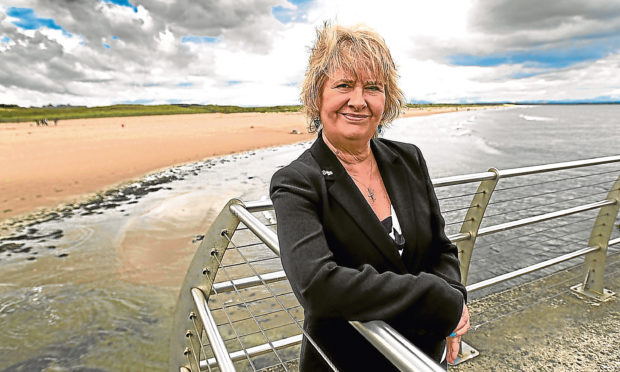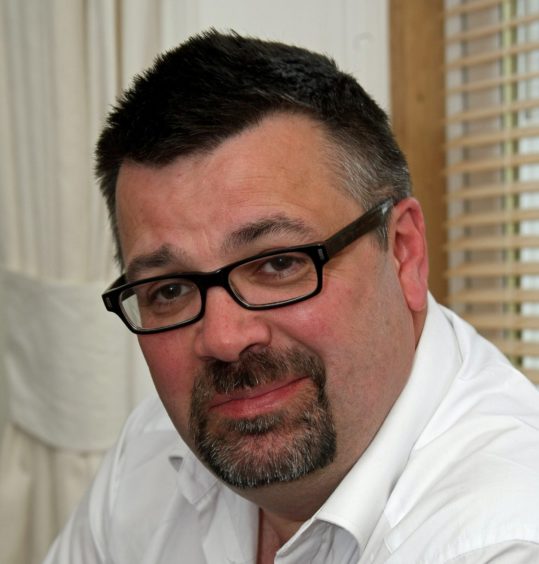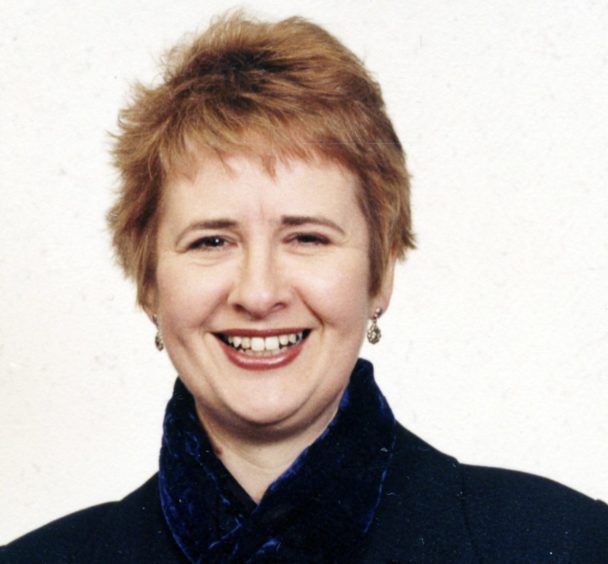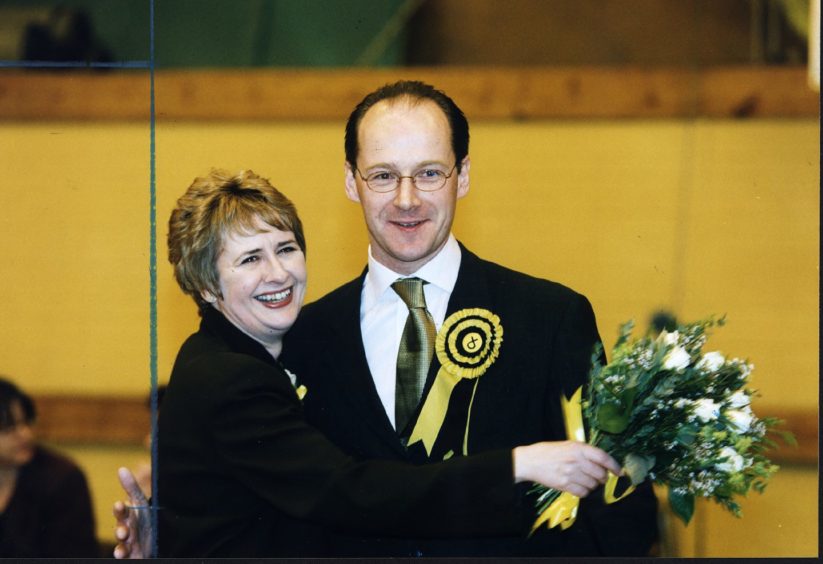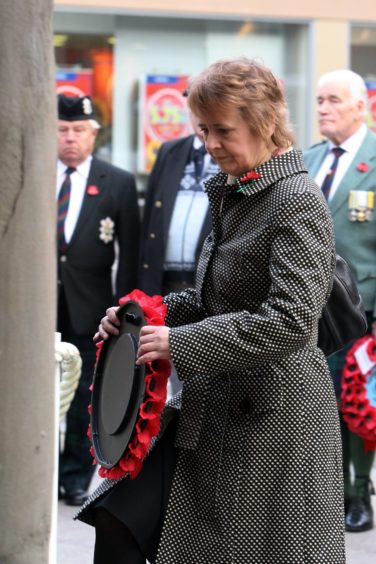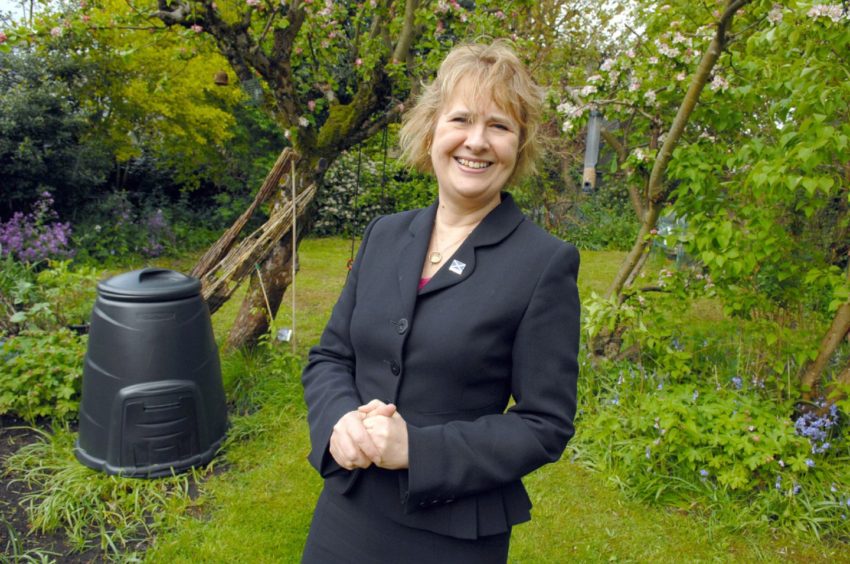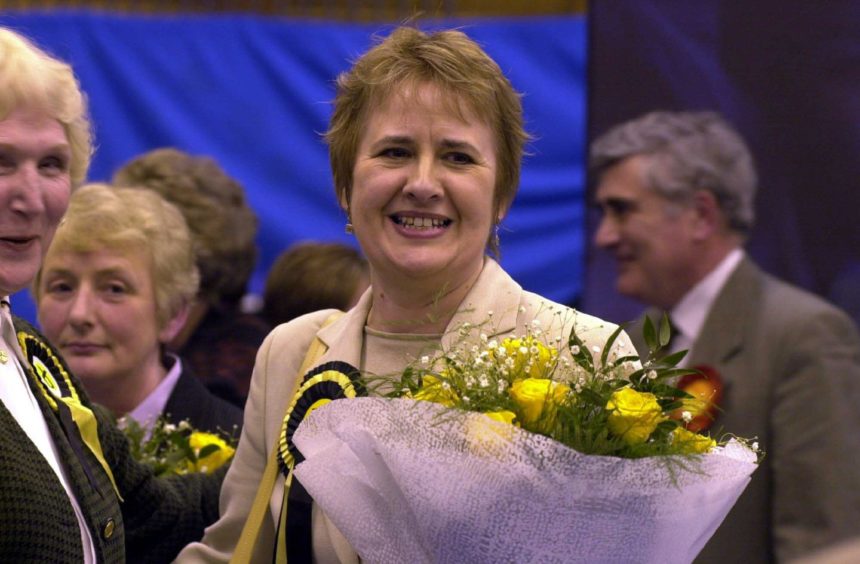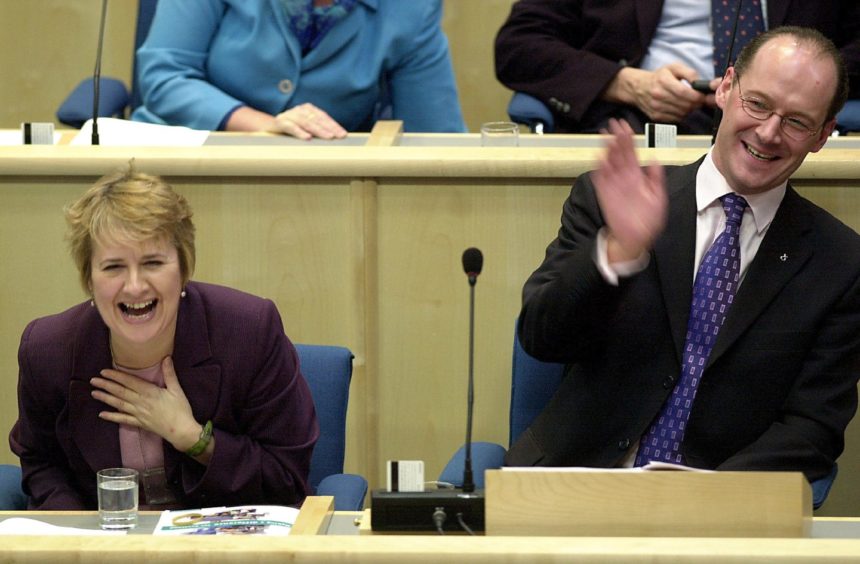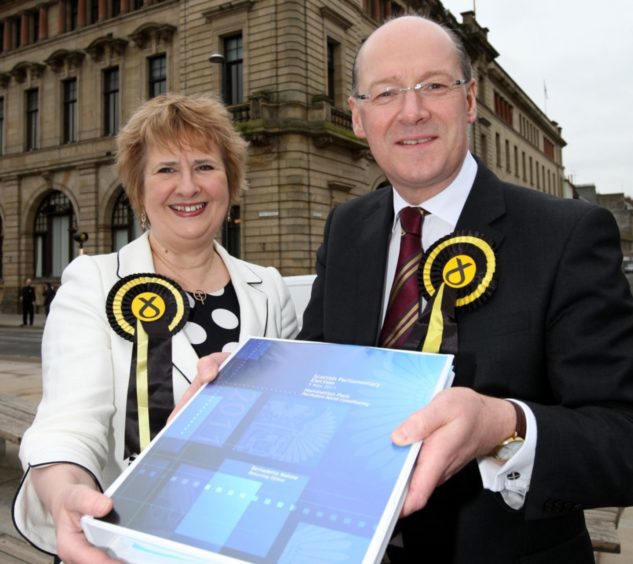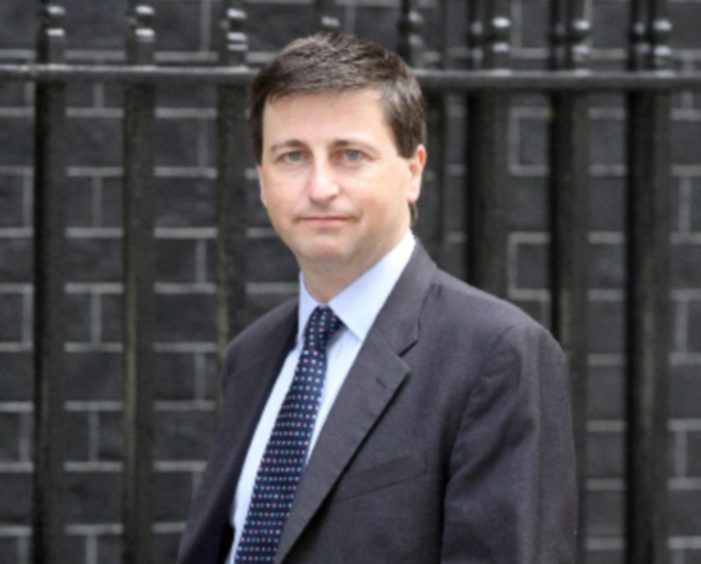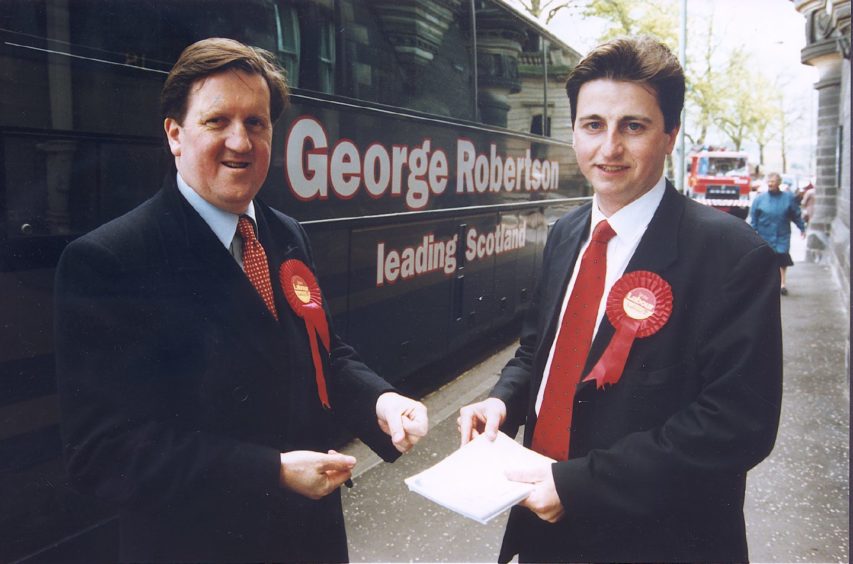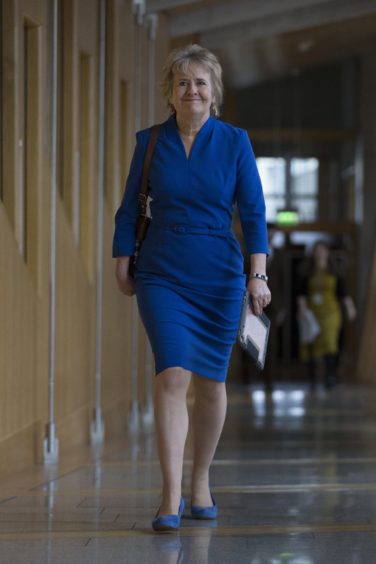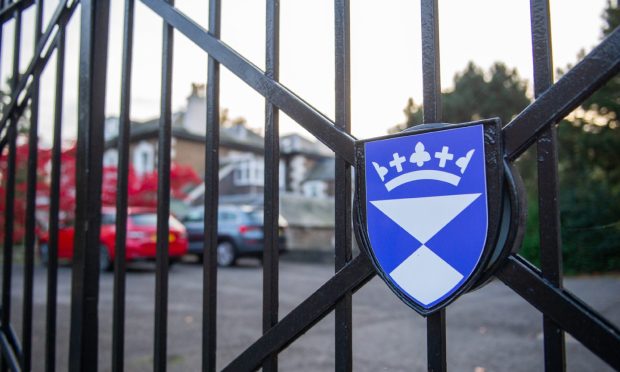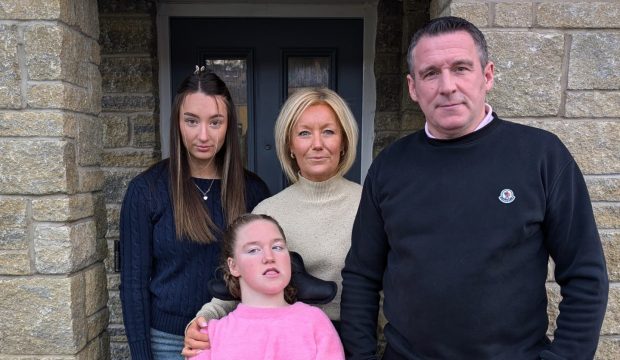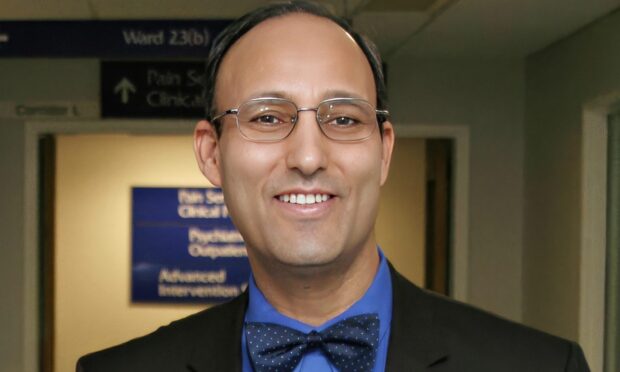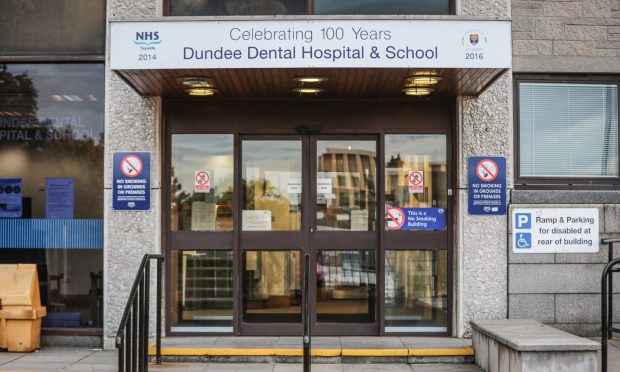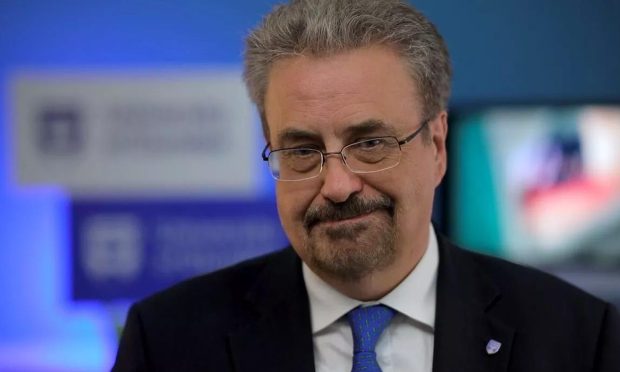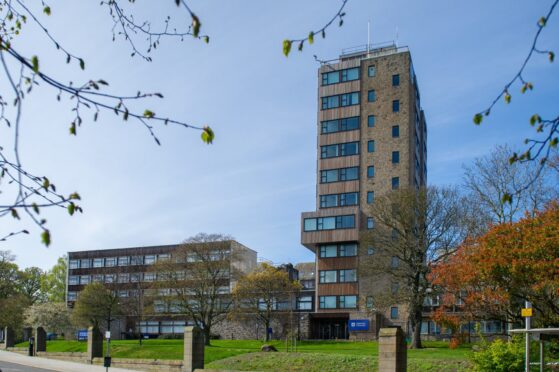Environment Secretary Roseanna Cunningham’s decision not to seek nomination as an SNP candidate for the 2021 Scottish Parliament elections has cast political minds back to her historic victory in a Westminster by-election 26 years ago.
On May 25, 1995, in a by-election called following the death of sitting Tory MP Sir Nicholas Fairbairn, Ms Cunningham was first elected to represent the Perth and Kinross constituency where she turned a 2094 Conservative majority into a 7311 majority for the SNP.
Her win was significant as the area had been staunchly Tory for most years since the 1920s.
Perhaps even more significant, however, was the fact she was re-elected at the 1997 general election for the redrawn and renamed constituency of Perth, making her the first SNP by-election victor to hold the seat at the subsequent general election.
ANDY NICOLL
Recently retired veteran Sun political editor Andy Nicoll, 58, who was political editor of The Courier covering the 1995 by-election, recalled how the atmosphere of Scottish politics was “fervered” in those pre-Scottish Parliament days.
Three years into the post-Thatcher John Major-led Conservative government at Westminster, anger was “boiling away” that after 16 years of Conservative rule, the Tories could still “impose” policy on Scotland with just 11/72 Scottish MPs.
Cross-party pressure groups like Scotland United and the Constitutional Convention had been demanding devolution amid claims that the London-based Government had no moral authority to deny Scotland a voice.
But more than that, with no other regular focus for Scottish politics, every by-election became a “circus” where political journalists would decamp for three weeks trying to “trip people up every step of the way”.
It was into this world of tense daily press conferences, canvassing and hustings that the Perth and Kinross candidates drew swords.
Roseanna Cunningham, then aged 43, who had been a big part of the more militant end of the SNP for many years, was up against Conservative merchant banker John Godfrey, Lib Dem Veronica Linklater and a then little-known young Labour candidate and future Tony Blair government Cabinet minister Douglas Alexander.
Yet despite the declining fortunes of the Tories nationally, it wasn’t to be an easy campaign for Ms Cunningham.
A staunchly Tory seat
“Perth and Kinross had been a Tory seat since Adam was in short trousers,” said Andy.
“It had been the seat of Alec Douglas-Home who was a Conservative prime minister in the early 1960s.
“It had been Tory through and though and was held prior to the by election by Nicky Fairbairn who was an enormously flamboyant and controversial figure who wore these ridiculous tartan outfits and feathered bunnets. He was a character!
“But when he died, the vacancy came up.”
Andy doesn’t recall the Perth and Kinross by-election as being particularly “vicious”.
However, the “real heat” of the campaign was between Roseanna and the Tory candidate John Godfrey.
While the SNP had only won three seats at the 1992 general election (despite winning 21.5% of the vote) and were very much seen as a “fringe” party, they had held Perth and East Perthshire from 1974-79, and there was a real sense that she could “pull this off” which, from a political journalism perspective, was “the story”.
“The act of choosing Roseanna as the candidate was itself quite daring,” said Andy.
“She was known as the ‘Republican Rose’.
She was hit during the election campaign with the truthful allegation that she described the Queen as the pinnacle of the class system and called for the abolition of the monarchy and the rest of it.
“The Tories thought that would play heavily in Perth. You’ve got the Black Watch, you’ve got the Royal family, the Queen Mother – all that stuff. But it didn’t cut through.”
Andy said the failing national fortunes of the Conservatives were always going to make it difficult for their candidate to win.
But he said there was a “legendary moment” in the campaign that all but sealed the Tories’ fate.
“May 1995 and there were all these commemorations going on to mark the 50th anniversary of the end of Second World War,” recalled Andy.
“The Tories decided they were going to make this the issue here in Black Watch country. They would talk about military might and the Conservative commitment to Scotland’s armed forces.
“John Godfrey started this press briefing in the Isle of Skye Hotel, and gave this long spiele about how much he cared for Scotland’s defence and all the rest of it.
“And I said to him, ‘can you name the Scottish regiments?’ He just went glum. He couldn’t. In those days there was a kind of a flying circus and a pack mentality amongst the media, and when the blood hit the water everybody just jumped in…!”
KEVIN PRINGLE
Kevin Pringle was 27-years-old and months into his leading role as SNP director of communications and research at the “must win” 1995 by-election.
At a time when Scotland’s historic regiments faced amalgamation, he recalls Andy Nicoll’s grilling of the Conservative candidate on defence as “probably the funniest moment” of the campaign.
“John Godfrey couldn’t name any of them – not even the Black Watch despite being in Black Watch country!” recalled Kevin.
Against a backdrop of Black Wednesday, Tory government sleaze and an accumulation of policies like the poll tax going back to the 1980s, the local issues encountered by John Godfrey simply added to the sense that the Tories were “failing” and a “party on the way out,” Kevin said.
However, Roseanna also deserved great credit for the “honest, no-nonsense” way she handled herself during what was a “really gruelling” campaign.
A high profile figure in the SNP, she was “well briefed” and knew the seat well having been the unsuccessful candidate in the 1992 general election.
But more importantly, Kevin said, she came across as someone who was “tough”, “honest” and would “stick to her guns”.
“She was honest and that was important because she got challenged on issues where she had a different perspective to the SNP as a whole – for example, on the monarchy,” said Kevin.
“The Tories used ‘Republican Rose’ quite heavily and even used that term against her.
But it worked for her and stood her in good stead because she wasn’t a person who was going to run away from what she believed.
“Rather than back tracking on it for the convenience of a by-election, she stuck to it.
“What came across in doing that is that here is somebody who is politically an honest person.
Tough nut to crack
“At an NFU hustings, she didn’t pretend to know everything about agriculture.
“But as a professional advocate, she promised to learn all about it and be as strong and effective a representative as she could be.
“I think this is what people would want from their MP whatever the party – somebody who’s got a toughness to them.”
Kevin says there’s no doubt Scottish politics had a “ghoulish element” to it back then with little day-to-day reporting of Scottish affairs. By-elections were the highlight.
For a relatively small yet highly ambitious party like the SNP, it was an opportunity to demonstrate “real progress” by turning votes into seats and to show that the party could be the “main challenger” in Scottish politics.
Yet not withstanding that the Tories were in trouble, Kevin said Perth and Kinross was still a “very tough nut to crack.”
Labour threat
As well as a strong tradition of Toryism to overcome, a threat came from a revived Labour Party under Tony Blair – likely offering devolution if elected in 1997 – and a “very good candidate” in the form of Douglas Alexander.
“Probably the biggest risk was the non-Tory vote splitting sufficiently that the SNP would just fall short, which wasn’t inconceivable,” Kevin recalled.
“Tony Blair had been elected Labour leader just the year before. Labour were really on a mission to show they could actually do well everywhere – even in seats where they hadn’t done very much at all like Perth.
“They were on a mission to show that the appeal of New Labour was strong everywhere and they could win not just in Middle England but in Middle Scotland as well, and Perth was a good example of a Middle Scotland kind of seat.”
As it turned out of course, the SNP gained a hard fought victory and, in a glimpse of what was to follow two years later when Tony Blair’s New Labour swept to power at Westminster, Labour came second and the Tories slumped into third place.
Crucially, Roseanna Cunningham made history for the SNP when she was re-elected MP at the 1997 general election – the first SNP MP to win a by-election then hold it.
In 1999, following the establishment of the Scottish Parliament, she was elected as the MSP for Perth, re-elected to represent that constituency in 2003 and 2007, then the redrawn and renamed constituency of Perthshire South and Kinross-shire in 2011 and 2016.
Significantly, however, Kevin thinks the decision by Roseanna and all six senior SNP MPs at the time to switch to Holyrood in 1999, added to the momentum of the SNP and, without being complacent, the road to political dominance they have today.
It showed that the Scottish Parliament was the “premier political institution” in Scotland and the “cockpit of debate”.
That group of experienced former Westminster parliamentarians, not least Roseanna, helped lead the SNP front bench challenge to the Labour/Lib Dem Scottish Executive that emerged from the 1999 election.
“In that sense, it did send the SNP on course to become the government in Scotland – not at the next election in 2003, but at the one after,” he added.
“With the best the SNP had to offer then deciding that Holyrood was the future for them, it made it much more likely that one day the SNP would win a Holyrood election and form the government of Scotland.
“It was a must win seat that by-election. In a sense it did help set the direction of where Scottish politics has gone to this day. In that sense, Roseanna’s win 25 years ago is still having an influence and an impact on Scottish politics today.”
DOUGLAS ALEXANDER
Former Labour cabinet minister Douglas Alexander looks back on the 1995 by-election in Perth and Kinross with “very fond memories and great affection”.
He recalls a “hard fought and good humoured campaign” where there was “genuine respect” amongst the candidates.
The then young Edinburgh-based lawyer pushed the Conservative candidate into third place.
He again finished second behind the SNP when he stood in the newly drawn Perth constituency at the 1997 general election, achieving a further swing for Labour with a 24.8% share of the vote compared to 22.9% during the by-election.
However, his Perth experiences stood him in good stead when he was elected to serve Paisley South in the November 1997 by-election sparked by the sudden death of sitting Labour MP Gordon McMaster.
“The experience of having fought one by-election was helpful in fighting another by-election albeit that none of us could have foreseen that those would have been the circumstances that I would be elected to the House of Commons,” Douglas said.
“But in that sense I thoroughly enjoyed my time campaigning in Perth before the 1995 by election then in the two years following ahead of the general election in 1997.
“There’s no doubt the tide was running in Labour’s favour across the UK and also in Scotland at the time.
“Perth and Kinross was an area of the country where Labour had never in recent times had a significant presence in terms of parliamentary representation.
“So we started the campaign against the odds, but thanks to both the dedicated hard work of party members and an unprecedented level of support from the national party, we were able to plant Labour’s flag firmly in Perth for the first time.”
Douglas says Labour benefitted both from a sense of hostility towards the Conservative government and the fact people were looking for an alternative.
Given that the SNP had before then been second in that seat, he said it was likely from the outset that they would win the by-election at a time when the Tory tide was falling.
However, he says there’s no doubt the Labour results in 1995 and 1997 were good ones considering Labour had not enjoyed significant support there before.
‘Not surprised’ at Holyrood jump
Douglas said he’s not surprised SNP MPs like John Swinney and Roseanna Cunningham – who had “no prospect of ever being in government at Westminster” – chose Holyrood over London in 1999.
By contrast, come the end of 1997, Fife MP Gordon Brown was a “reforming Chancellor of the Exchequer with extraordinary capacity to effect the lives of millions of people right across Scotland as well as the whole of the United Kingdom”.
It was a sense of purpose shared by other Scottish Labour MPs like Robin Cook, George Robertson, John Reid or himself who served in that Labour government – working alongside Donald Dewar and his colleagues after 1999 with a Labour administration delivering at Holyrood.
However, while Douglas stands by Labour’s record in government during those years and is saddened by the “failing public services” he believes the SNP preside over at Holyrood today, he says the SNP deserves recognition for their effectiveness as campaigners.
The former MP, who lost his seat to 20-year-old Mhairi Black of the SNP at the 2015 general election, also remains deeply respectful towards Roseanna Cunningham for her longevity as a public servant.
“I was head to head with Roseanna in 1995 and 1997, but I was also on the stage with her in Culloden High School in the following years in what turned out to be a decisive moment in terms of the SNP’s history,” he recalled.
“Because apparently it was after watching that Question Time from Culloden High School that Alex Salmond decided to return and seek the leadership of the Scottish National Party when he was serving at Westminster.
“It’s been fascinating to watch how those dynamics have developed within the SNP over the years.
“But I suppose the only other point I would say is whether it was Roseanna Cunningham, whether it was Veronica Linklater – I faced formidable opponents in 1995.
“I look back on that contest with pride and with enthusiasm.
“But I also think it’s worth recognising that two decades of service in elected office is worthy of recognition and respect.
“Roseanna was a worthy opponent back in 1995, and in times when it’s all too easy for people to criticise politicians and politics, I think it’s worth marking her retirement by recognising that she’s given dedicated service not just to people in Perth, but to people across Scotland for many years.
“As somebody who doesn’t share her politics, I think it’s important to recognise that.”
ROSEANNA CUNNINGHAM INTERVIEW
- A recent Courier interview with Roseanna Cunningham can be read here.
